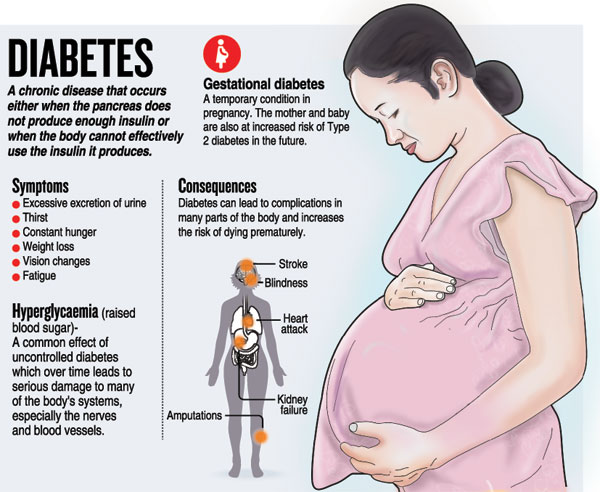Don’t let diabetes strike you during pregnancy
As young women tie the knot and step into wedded bliss, with the hope of experiencing the joy of motherhood, most are not armed with a vital fact. A fact which they need to be made aware of when they are girls – that it is important to maintain a healthy lifestyle which includes eating healthy food and keeping fit through exercise.
 For, if girls are obese, the chances of developing diabetes during pregnancy when they are women, rise significantly. The repercussions of ‘diabetes in pregnancy’ are two-fold – it not only affects the mother but also the baby. This is why the just-commemorated World Diabetes Day (November 14), has taken as its theme ‘Women and Diabetes: Our right to a healthy future’.
For, if girls are obese, the chances of developing diabetes during pregnancy when they are women, rise significantly. The repercussions of ‘diabetes in pregnancy’ are two-fold – it not only affects the mother but also the baby. This is why the just-commemorated World Diabetes Day (November 14), has taken as its theme ‘Women and Diabetes: Our right to a healthy future’.
The two strong and powerful voices of Consultant Endocrinologists Dr. Manilka Sumanatilleke and Dr. Prasad Katulanda join to guide women away from the unhealthy path to diabetes, by waving the red-flag of risks.
If the mother is obese and her blood sugar is high, the foetus’s intra-uterine (in the womb) growth can get retarded, says Dr. Katulanda who is attached to the University Medical Unit of the National Hospital of Sri Lanka, adding that there could also be many complications during her labour which would result in a Caesarean operation having to be performed, rather than a normal birth. There could also be neonatal distress.
It is Dr. Sumanatilleke, the President of the Sri Lanka College of Endocrinologists, who opens up the long-term dangers, pointing out that even the genetic programming of the baby could get affected, setting off metabolic changes in the newborn if the mother is obese and diabetic.
“Earlier, the thinking was that it takes hundreds of thousands of years for genetic changes or how genes divert from their usual expression and these abnormalities generally come about due to environmental changes. However, now there are new theories that if the mother is a diabetic this could cause foetal genetic imprinting,” he says.
This means that instead of the DNA (Deoxyribonucleic acid is a molecule that has genetic instructions used in growth, development, functioning and more) sequence of the foetus being changed, these metabolic derangements impact on epigenetic factors. This, in turn, will affect how the gene is expressed in the child, according to Dr. Sumanatilleke.
Citing an example, he says that there are genes which control the basal metabolic rate (the amount of energy that is utilized by a person when resting) and satiety (hunger), which are both individualistic. If a mother is a diabetic with poor control, the high sugar itself can have a detrimental effect on the gene expression of the foetus. The genes controlling the metabolism of the foetus can be affected adversely.
“Although the mother has a high basal metabolic rate, the child may have a slower metabolic rate which could lead to metabolic derangement in the child when he/she grows up,” explains Dr. Sumanatilleke.
Dr. Katulanda adds that women who are prone to diabetes while pregnant also have a higher chance of becoming diabetics in later life. As such prevention is the best.
Dr. Sumanatilleke and Dr. Katulanda warn against myths that are ingrained and certain actions people resort to while also providing guidance on what measures should be taken:
Myth – Medication that is prescribed for diabetes is bad and causes organ damage and diabetes can be controlled through healthy eating and exercise only.
According to these experts, doctors prescribe medication when it is necessary to control high blood sugar which cannot be controlled only through a healthy diet and exercise. Medications prevent complications such as kidney failure, nerve damage, heart attacks, strokes and eye issues. There is immense danger if diabetics do not take their medications.
First-line of medications such as metformin which is plant-based, for Type 2 diabetes have undergone stringent laboratory testing, animal and human studies and also post-market surveillance for 60 years.
When the patient stops his medication, his/her blood sugar levels sky-rocket, resulting in complications which turn out to be ‘silent killers’, as there are no evident symptoms.
Do not try out unproven and unscientific methods of so-called treatment.
Screening and early detection are vital – If a person has diabetes, regular checking of HbA1c, at least every six months is important. If the
HbA1c level is not less than 7, then the testing should be every three months.
Check eyes, feet and kidneys closely – This should be done at least once a year.
| Keeping diabetes at bay The basics at a glance to keep diabetes at bay or if you have high blood sugar, to control it. A – Check HbA1c | |


